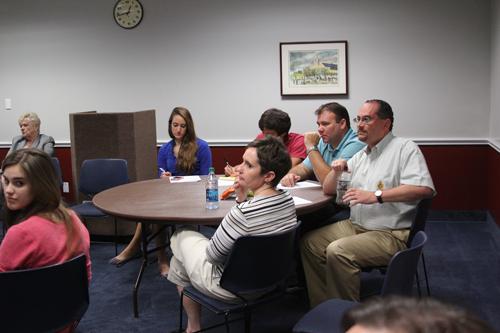
Professors, community members and students gathered to learn about Catholicism and its tenets over lunch on Monday. (Emily Wu/The Daily Campus)
A room filled with round tables and dozens of folding chairs provided the arena for the first discussion of the Brown Bag Series, Catholic Social Teaching: Why does it matter?
Thirty people gathered in Hughes-Trigg Student Center, Atrium A/B for the Brown Bag Series on Catholic social teaching Monday. About 5 of those people were students, and the rest were SMU professors and community members.
Ellen Pryor, professor at the Dedman School of Law, and Matthew Wilson, professor of political science at SMU facilitated the discussion that was hosted by Judy Henneberger, Associate Chaplain at SMU.
Central terms to catholic social teaching like solidarity, subsidiarity, universal destination of goods and preferential option for the poor began the conversation. Wilson exemplified solidarity to knowing that “we’re all in it together.
One must ask ‘what’s best for the collective?'” rather than thinking about themselves or only a small group.
He uses an analogy for subsidiarity, saying that “It is better for a neighbor to help a neighbor in need than it is to get a personal check in the mail.” These aren’t only values that many Catholics live by, but attitudes that anyone may be able to embrace.
So why does catholic social teaching matter? “We have to stop thinking about how we live out our lives, and live out the common good,” said Henneberger after Monday’s discussion.
Paola Buckley, professor of French at SMU, believes that those who left the discussion today left wanting more. “Everybody has something to say about [social issues] because it affects us all,” said Buckley. It’s not just a discussion among Catholics, though most people at the event were Catholic. Buckley sees it as “a common information gathering, and you can apply it however you see fit to apply it.”
Judy Henneberger said that this discussion series began with herself and other SMU Catholics because of the issues that are arising as we approach the presidential election season. However, this series of conversations is not supposed to be political, and Henneberger is very glad that the room did not become politically heated on Monday.
According to Henneberger, the main point of this first meeting was to see if there was interest in the topic.
Before the first meeting of a series, it is difficult to gauge how many people will turn out. Considering that the room was full of people, there was considerable interest among the people of SMU. Henneberger and Pryor were pleased with the interest level.
Pryor said that this particular Brown Bag discussion is important because they will talk about many issues that have recently been in the news.
Many people do not know what catholic social teaching is, but she wants to show the “rich and deep tradition of catholic social teaching across all areas,” which may be expressed in later discussions of this series.
Values of catholic social teaching are “applicable to our lives, and how we should be acting on campus,” Christopher Carrillo, said. SMU sophomore. Carrillo, who is studying Environmental Engineering and is heavily involved at the SMU Catholic Center, said he enjoyed the meeting, and will come to the discussion next month because he wants to learn more about catholic social teaching.
He also wants to utilize it in his career after graduating from SMU.
Henneberger says that “we try on the campus often times to have discussion about these social issues, and I’m blown off. They say, ‘oh, you’re just Catholic.’
But people don’t realize that we do have something to offer in our teaching and in our doctrine.” Henneberger is encouraging students and staff to come to next month’s discussion and other future discussions, whether or not they are Catholic because it can be a very informative yet casual discussion.
Issues regarding education, Medicare, social policy, demographics and the economy will likely be discussed next month, Henneberger said.








